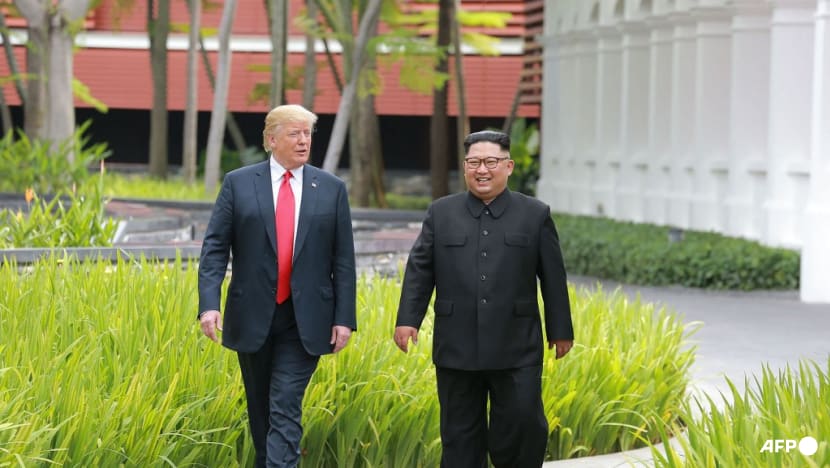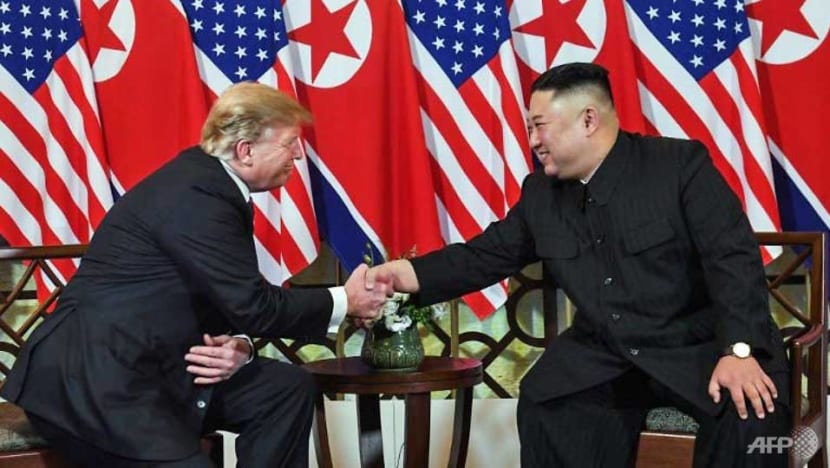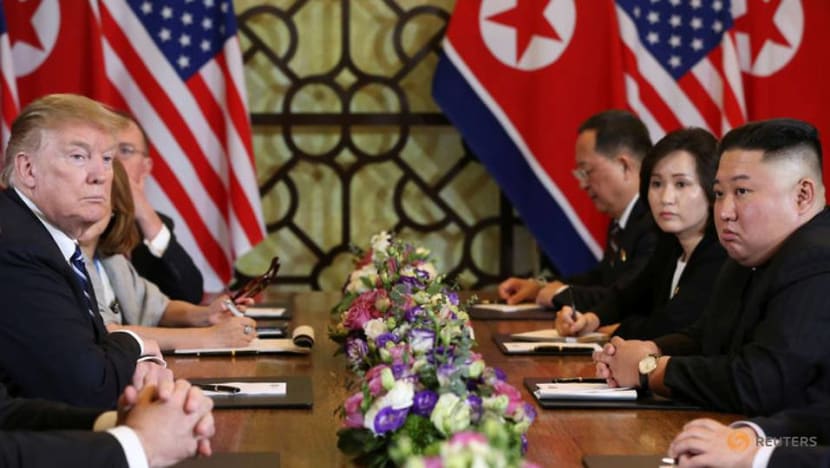Commentary: Trump’s summits with Kim Jong Un have all failed. Why would the next one be any different?
US President Donald Trump’s first-term summits with North Korean leader Kim Jong Un made global headlines but yielded no concrete results. Another one would be more spectacle than substance without a concrete plan, says professor of political science Robert Kelly.


This audio is generated by an AI tool.
BUSAN: In his first term, United States President Donald Trump met North Korean leader Kim Jong Un three times - first in Singapore in 2018, then in Vietnam in February 2019 and finally at the demilitarised zone in June 2019.
No deals were struck.
Now, in his second presidential term, Mr Trump is once again talking about meeting Mr Kim. However, if neither leader is unwilling to make concessions, the outcome is likely to be the same as their previous meetings - performative excitement to satisfy their lust for global attention, with no real progress on the actual issues at stake.
WHAT HAPPENED LAST TIME
In 2017, Mr Trump issued his notorious threat to rain “fire and fury” on North Korea. For the last few months of that year, war seemed likely. In retrospect though, it appears Mr Trump’s belligerence was intended to push Mr Kim into negotiations.
In 2018, Mr Trump suddenly wanted to meet Mr Kim personally. The summits that followed drew massive media attention, but no meaningful agreement came from all the hullabaloo.
Indeed, we have learnt from Mr Trump’s staff, in their various retrospective books and articles, he went to these meetings unprepared. He reportedly did not read the briefing materials he was given. He did not understand the issues. He did not lead a US government policy process to work up serious offers to Mr Kim.
Thus, when the two leaders clashed over specifics in Hanoi, Mr Trump, unwilling to accept Mr Kim’s demands, simply walked out of the meeting.
Given Mr Trump’s well-known craving for media attention and drama, this probably played to his own ego needs. But it undercut his hopes for a Nobel Peace Prize and left the Korean Peninsula no better off.
Unfortunately, this is the likely template for another round of Trump-Kim summitry. Mr Trump is the same man he was in his first term.
Complicating matters further, Mr Trump’s national security advisor and secretary of state are both hawks on North Korea who continue to speak of its complete denuclearisation. This is so unlikely that demanding it will sabotage a Trump-Kim summit before it even takes place.
Another Trump-Kim summit will likely see Mr Trump once again walk into the room with no preparation and improvise. This will make for good TV but no deal - just like last time.


THERE IS NO DEAL WITHOUT US CONCESSIONS
The US and North Korea are politically and strategically very far apart. Their differences cannot be resolved by a single, dramatic hammer-stroke, like a summit among “friends” as Mr Trump insists he and Mr Kim are.
If Mr Trump is serious about reaching an agreement, he needs to make a detailed offer to Mr Kim. In fact, he probably needs to offer several different, detailed offers, so that there is room for him and Mr Kim to make swaps and trades when they disagree. These offers also need to have buy-in from relevant parties in Washington - the Defense Department, State Department, Congress, the North Korea-watching think-tank community - and South Korea.
Without support from important constituencies in the US and South Korea, any deal Mr Trump makes risks bureaucratic resistance. This is what happened when then-president Bill Clinton struck a deal with North Korea in the 1990s without Congressional Republican support.
Next, Mr Trump’s offers must include concessions from the US. North Korea will not just denuclearise because of US threats, or vague offers of money or future concessions. Mr Trump has already tried that, unsuccessfully.
This will be hard. No one wants to make concessions to Pyongyang, particularly given how awful the regime is. But without some form of compromise, North Korea will not negotiate. We learnt that between 2017 and 2019.
US concessions might include a lifting of United Nations sanctions, financial aid, some level of diplomatic recognition, a reconfiguration of US forces on the Korean Peninsula, and so on. These US concessions would be traded for North Korean counter-concessions. Pyongyang will not completely denuclearise, so demanding that - as Mr Trump did in Hanoi - will end the negotiations.
Instead, Mr Trump should ask for transparency and limits. That means pressing North Korea to reveal how many missiles, warheads, and nuclear plants it has. Could a deal also be structured to cap its stockpile at a fixed number of warheads and missiles?
There are also non-nuclear issues to negotiate. For example, North Korea maintains a massive conventional military presence right on the intra-Korean border near South Korea’s capital. Could it be incentivised to pull back and reduce that force? North Korea also operates appalling gulag prison camps. Could it be persuaded to improve conditions?
All these issues are complex and interconnected. North Korea has a long history of tough bargaining. It will not simply yield to the threats and bluster that Mr Trump has used, even against US allies like Canada.
If Mr Trump is to succeed, he will need to understand the key issues well enough to know what to bargain for and what can be given away without too much loss. Yet, little from his first term suggests he can do this.
Robert Kelly (@Robert_E_Kelly) is a professor of political science at Pusan National University.

















